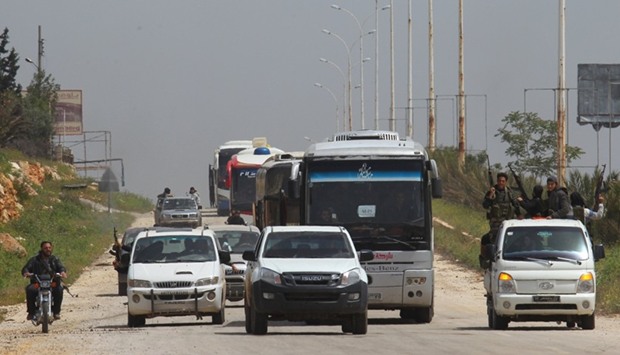Busloads of civilians and pro-government fighters from the towns of al-Foua and Kefraya arrived in army-held Aleppo after waiting for two days at the city's outskirts, a war monitoring group said.
Thousands of evacuees from the two rebel-besieged Shia towns had been stuck at a staging area outside Aleppo, where a bomb attack on an evacuation convoy killed scores of people last week.
In exchange, hundreds of rebels and their relatives from Zabadani left a second nearby transit point for rebel territory, state television said.
The towns of Zabadani and Madaya, which had long been under siege by pro-government forces near Damascus, came under state rule this week after Sunni rebels and civilians were evacuated.
The Syrian Observatory for Human Rights, a Britain-based war monitor, said the 48-hour suspension was due to rebel demands for the government to free 750 prisoners under the deal.
Rebels reached an agreement on Friday with the Syrian government for it to release 500 prisoners who will then cross into rebel territory as part of the evacuation deal, a rebel official told Reuters.
Mohamad Abu Zeid, a spokesman for the Ahrar al-Sham faction, said negotiations over the issue had concluded and that the prisoners would arrive at a rebel-held area outside Aleppo city "within hours".
The Syrian army could not immediately be reached for comment.
A senior Arab diplomat in Qatar involved in the negotiations told Reuters that Iranian officials and Ahrar al-Sham held discussions about the overall four-towns swap in Qatar when Iran’s foreign minister visited Doha in March.
Those discussions also involved the freeing of 26 Qatari hostages held by unidentified gunmen in Iraq, he said.
During evacuations on Saturday, a bomb blast hit a packed convoy carrying evacuees from al-Foua and Kefraya, killing at least 126 people, including more than 60 children, who were waiting on Aleppo's outskirts.
Syrian President Bashar al-Assad was cited as saying the ex-Nusra Front faction carried out the bombing, which no group has yet claimed responsibility for.
The Nusra Front was al Qaeda's formal affiliate in Syria until it broke off its allegiance to the global militant movement and rebranded itself last year. It merged with a number of Islamist groups in January under a new jihadist alliance called Tahrir al-Sham.
Thousands of Syrians have been evacuated mostly out of besieged opposition areas in recent months, under deals between Assad's government and rebel groups fighting for six years to unseat him.
UN Syria humanitarian adviser Jan Egeland said there had been more evacuation deals this year than before, but that they appeared driven more by military priorities than humanitarian concerns.
"They seem to follow a military logic, they do not seem to put the civilians at the heart of the agreement," he told reporters in Geneva on Thursday.
The United Nations was not involved in the evacuation of the four towns, Egeland said, adding that it was misleading to consider them voluntary evacuations when the towns had been besieged for years.
"Besiegement should end by being lifted," he said, "not by places being emptied from people."

A convoy of buses carrying Sunni rebels and civilians, who were evacuated from Zabadani and Madaya, as part of a reciprocal evacuation deal for four besieged towns, travels towards rebel-held Idlib.
The evacuation of Syrian civilians and fighters from four besieged towns, part of a mediated swap deal between the warring sides, ended on Friday after a 48-hour halt, state media and a rebel official said.
